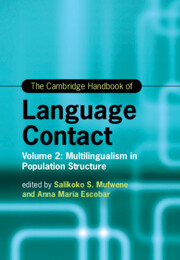Book contents
- The Cambridge Handbook of Language Contact
- Cambridge Handbooks in Language and Linguistics
- The Cambridge Handbook of Language Contact
- Copyright page
- Contents
- Maps Volume II
- Figures Volume II
- Tables Volume II
- Contributors
- Preface
- Introduction
- Part One Multilingualism
- Part Two Contact, Emergence, and Language Classification
- 10 Perspectives on Creole Formation
- 11 Non-European Pidgins in Early European Colonial Explorations and Trade: Mobilian Jargon and Maritime Polynesian Pidgin in Contrast
- 12 Mixed Languages
- 13 Reconstructing the Sociolinguistic History of Expansion Languages in the Americas: A Research Program
- 14 On the Idiolectal Nature of Lexical and Phonological Contact: Spaniards, Nahuas, and Yorubas in the New World
- Part Three Lingua Francas
- Part Four Language Vitality
- Part Five Contact and Language Structures
- Author Index
- Language Index
- Subject Index
- References
13 - Reconstructing the Sociolinguistic History of Expansion Languages in the Americas: A Research Program
from Part Two - Contact, Emergence, and Language Classification
Published online by Cambridge University Press: 02 June 2022
- The Cambridge Handbook of Language Contact
- Cambridge Handbooks in Language and Linguistics
- The Cambridge Handbook of Language Contact
- Copyright page
- Contents
- Maps Volume II
- Figures Volume II
- Tables Volume II
- Contributors
- Preface
- Introduction
- Part One Multilingualism
- Part Two Contact, Emergence, and Language Classification
- 10 Perspectives on Creole Formation
- 11 Non-European Pidgins in Early European Colonial Explorations and Trade: Mobilian Jargon and Maritime Polynesian Pidgin in Contrast
- 12 Mixed Languages
- 13 Reconstructing the Sociolinguistic History of Expansion Languages in the Americas: A Research Program
- 14 On the Idiolectal Nature of Lexical and Phonological Contact: Spaniards, Nahuas, and Yorubas in the New World
- Part Three Lingua Francas
- Part Four Language Vitality
- Part Five Contact and Language Structures
- Author Index
- Language Index
- Subject Index
- References
Summary
In this chapter the author addresses the following questions: What does it mean to say that a language is a creole? Do creoles constitute a separate global typological class apart from other language typological groupings? The author calls for research on creole languages that is free from linguistic feature bias, creole language list bias, and genealogical bias. He compares expansion languages from the Meso and South American indigenous language families, particularly the Quechuan family (focusing on Ecuador, the northern border), with the Arawakan, Tupian, Cariban, Jêan, Chibchan, Uto-Aztecan, Mayan, and Otomanguean families. The comparison highlights processes of ethnogenesis, morphological reduction, and sub- or adstrate influence. The findings help broaden the definition of “creole” to refer to a special lexifier– descendant relationship, making the notion of creole a relational one, to facilitate comparisons with other languages and with “linguistic areas.” Questions that remain include: Are there area-specific features? And can this approach shed light on the characterization of creoles as a particular group of languages? What role can language contact play in reconstructing language families?
- Type
- Chapter
- Information
- The Cambridge Handbook of Language ContactVolume 2: Multilingualism in Population Structure, pp. 344 - 369Publisher: Cambridge University PressPrint publication year: 2022

